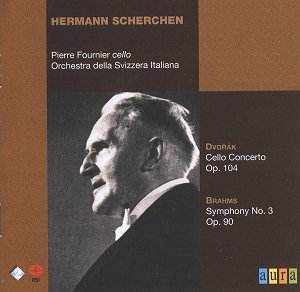There are competing versions of the 1962 Lugano concert
given by Fournier, Scherchen and the Orchestra della Svizzera Italiana.
On Tahra 428-29 we have both THE Dvorak Concerto and the Brahms Symphony
plus the rest of the concert, the orchestral Grosse Fuge and a bonus
in the form of a Scherchen-led rehearsal of Beethoven’s Seventh Symphony
from part of the 1965 cycle. Aura on the other hand gives us the greater
part of the concert and the combination of the patrician Fournier and
the more idiosyncratic, frequently flammable Scherchen results in a
potentially intriguing interpretative stance. Indeed the booklet notes
make much of Scherchen’s (supposed) affiliation of the Dvořák
Concerto with Tchaikovsky’s ballets and co-opt the view that the conductor
found the roots of the Concerto in the Piano Concertos of Chopin. None
of this seems to me explicable or sustainable on the recorded evidence.
With Scherchen Fournier is somewhat quicker in the
first movement than in his famous collaboration with Szell but in terms
of tempo and tempo relation these are very much in the expected pattern.
Scherchen encourages some strong orchestral profiling – the principal
clarinettist has a strongly acidic tone, which makes his contributions
characterful to say the least – and he is good at the theatrical implications
of the third movement accelerandos but I don’t at all care for his ending,
which is, in a rather vulgar phrase, a case of "milking it."
Fournier is as ever beautiful of tone and intonationally generally secure
– maybe not as secure in this respect as his colleague, the marvellous
Maurice Gendron, another noted exponent of the work – and it is especially
gratifying to hear Fournier’s careful delineation of passages that other
cellists rush through. His bowing at such moments is wondrous, with
shades of tone and balance, breathtaking to hear. But it’s not a performance
that can compete with the known commercial discography.
Scherchen’s Brahms Third is something of an acquired
taste. He doesn’t play the first movement exposition repeat and rather
indulges the second movement Andante that in this performance, for all
its eloquence, stretches to 10.21. No one wants to judge by the stopwatch
but supreme Brahmsians such as Monteux and Boult took 7.40 and 8.33
respectively in their performances (Monteux live, Boult in his Indian
Summer Brahms cycle). Even Barbirolli, not known for his fleetness when
it came to those generally rather disappointing Vienna recordings, took
9.04. I don’t think the line is quite sustained in Scherchen’s performance,
given. Incidentally. when he was seventy-one, so hardly particularly
old. He fares better in the Scherzo and if the finale hangs fire – which
to my ears it does rather – it’s still relatively attractive.
This means only a lukewarm reception for this issue,
for all the interest in hearing the ever-unpredictable Scherchen in
this repertoire. No real complaints about the sound quality – these
are all live performances – but equally no overwhelming enthusiasm for
the performances.
Jonathan Woolf

